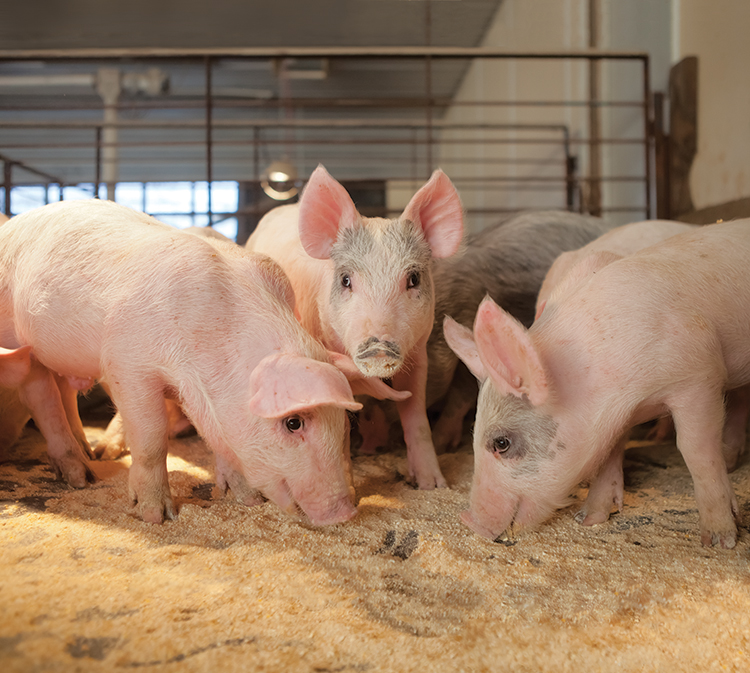If everything stays on schedule for the opening of the
Clemens Pork Processing facility in Coldwater in late 2017, Michigan’s pig farmers will no longer have to cross state lines to have their pigs processed and sent to market. It will be the first time in nearly two decades that Michigan will have a pork processing plant – an addition sending ripples throughout the state’s economy. “From an agriculture standpoint, there is a huge multiplier effect,” says Jodi Gruner, economic development analyst for the
Michigan Department of Agriculture and Rural Development (MDARD). “Clemens is looking at about 10,000 pigs processed per day to start, then 20,000 a day when marketing conditions are correct. That’s going to create a big growth within Michigan because 50 percent of the hogs will come from Michigan. It will also create more need for feed. There will be increases for soybeans, corn and transportation, and it will create more housing and other workforce needs. There will be a huge ripple effect.” MDARD was instrumental in paving the way toward the Clemens Food Group’s decision to open a processing plant in Michigan. The company, a family-owned integrated pork production operation, has been based in Pennsylvania since it was founded in 1895.
Value is in Processing
Even without a sizable in- state processor, the pork industry in Michigan has maintained an important role in the state’s food and agriculture system. It ranks 13th in U.S. pork production, with 2 million head of market hogs generating around $356 million in cash receipts in 2012 and nearly $600 million in total economic activity.  The need for a processor within the Great Lakes State has been building since 1998, when Thorn Apple Valley closed its Detroit processing facility and laid off 1,000 workers. That was the missing link. “MDARD had been working with the Michigan Pork Producers Association, just taking a look at a gap in our supply chain, which was the value-added processing piece,” Gruner says. “We were sending pork across state lines to be processed, which is no different than sending any other commodity. The value is in the processing. When Thorn Apple closed, we lost that. We have been looking for quite a while and working with producers.”
The need for a processor within the Great Lakes State has been building since 1998, when Thorn Apple Valley closed its Detroit processing facility and laid off 1,000 workers. That was the missing link. “MDARD had been working with the Michigan Pork Producers Association, just taking a look at a gap in our supply chain, which was the value-added processing piece,” Gruner says. “We were sending pork across state lines to be processed, which is no different than sending any other commodity. The value is in the processing. When Thorn Apple closed, we lost that. We have been looking for quite a while and working with producers.”
A Win-Win
Instrumental in raising support for the pork processing facility, Harley Sietsema of Sietsema Farms in Allendale and his business partner, Joel Phelps, led discussions about the project. They were able to secure a $100,000 value-added grant from MDARD to conduct a feasibility assessment on a pork processing plant in Michigan. The project moved forward after funds were elicited from other producers to match the grant.
“We retained a consulting firm to assist us in putting this together in a very detailed, thorough and complete method,” says Sietsema, who had led a similar effort for the state’s turkey farmers. “During that process, we pulled together several Michigan pork producers who we believed would be interested in this type of venture. We were kind of the impetus to move the project forward at that level. The study indicated that this would be feasible, with the number of animals in the state of Michigan and surrounding region. I think it’s a win-win.” Doug Clemens, CEO of the Clemens Family Corporation, agrees. “We had a long-standing relationship with several of the participating producers,” he says. “They asked us to help them throughout the information gathering for this feasibility study. Through information sharing, it became clear that this was a group of folks we could see ourselves working hand-in-hand with to pull the project together.”
 The game is about to change for pork producers in Michigan.
The game is about to change for pork producers in Michigan.  The need for a processor within the Great Lakes State has been building since 1998, when Thorn Apple Valley closed its Detroit processing facility and laid off 1,000 workers. That was the missing link. “MDARD had been working with the Michigan Pork Producers Association, just taking a look at a gap in our supply chain, which was the value-added processing piece,” Gruner says. “We were sending pork across state lines to be processed, which is no different than sending any other commodity. The value is in the processing. When Thorn Apple closed, we lost that. We have been looking for quite a while and working with producers.”
The need for a processor within the Great Lakes State has been building since 1998, when Thorn Apple Valley closed its Detroit processing facility and laid off 1,000 workers. That was the missing link. “MDARD had been working with the Michigan Pork Producers Association, just taking a look at a gap in our supply chain, which was the value-added processing piece,” Gruner says. “We were sending pork across state lines to be processed, which is no different than sending any other commodity. The value is in the processing. When Thorn Apple closed, we lost that. We have been looking for quite a while and working with producers.” 


